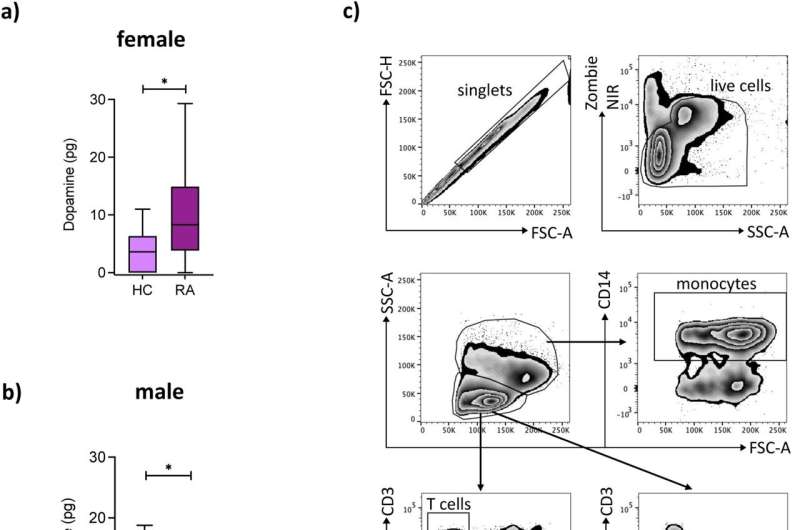Dopamine content and expression of tyrosine hydroxylase in peripheral immune cells from RA patients and HC. Dopamine level was measured in PBMCs obtained from healthy control (HC) and rheumatoid arthritis (RA) patients by TriCat ELISA and TH expression was analyzed by flow cytometry. (a, b) Concentration of dopamine in 106 freshly isolated PBMCs (HC female n = 10, RA female n = 14, HC male n = 11, RA male n = 10). (c) Gating strategy to discriminate between CD3+CD56- T cells, CD3-CD56+ NK cells, CD19+ B cells and CD14+ monocytes d) Quantification of TH expression in aforementioned PBMC subsets from HC and RA patients (HC female n = 24, RA female n = 27, HC male n = 16, RA male n = 15). Welch’s t test was used to compare catecholamine levels in PBMCs from HC and RA patients; Mixed-effects analysis with Geisser-Greenhouse correction and Sidak multiple comparison test was used for comparing TH expression between groups; *p ≤ 0.05. Credit: Scientific Reports (2022). DOI: 10.1038/s41598-022-09891-6
Rheumatoid arthritis (RA) is an autoimmune disease characterized by chronic joint inflammation that leads to functional impairment in many sufferers. There are gender-specific differences in the emergence and development of this disease.
Researchers at the Leibniz Research Center for Working Environment and Human Factors in Dortmund (IfADo) have therefore examined the role of the neurotransmitter dopamine in rheumatoid arthritis with particular reference to gender differences. The results point to gender-specific differences in the dopamine-regulated signaling pathway in B cells, whereby dopamine may even have a pro-inflammatory effect in women.
Prof. Dr. Silvia Capellino's group has identified involvement of the dopamine-regulated signaling pathway in B cells. This influence on immune cells of RA patients is gender-specific. The observed bifurcation of the dopamine-regulated signaling pathway between male and female RA patients can be used for therapeutic approaches in women in the future.
The influence of dopamine on certain cells of the immune system and thus on the course and development of rheumatoid arthritis discovered in the studies correlated with the duration of the disease and the functional disability in the female RA patients. Based on these findings now published in Scientific Reports, a diagnostic marker can be used in women.
Dopamine influences immunity
Women get rheumatoid arthritis more often than men. Not only the frequency, but also the progression of the disease differs between men and women. One possible explanation for this is the different role of sex hormones in immune reactions. Estrogens can directly influence the immune system and usually lead to inflammation.
The immune system can be influenced by the nervous system and neurotransmitters. Dopamine is a neurotransmitter that plays important roles not only in the brain but throughout the body. Recent findings show that the signaling pathways controlled by dopamine also play a key role in changing immunity. It is therefore possible that dopamine not only directly influences the immune system, but also that estrogens can change the signaling pathways controlled by dopamine, which again has an influence on the immune system. How exactly this works is currently being examined in a follow-up project.
More information: Karolin Wieber et al, Dopamine receptor 1 expressing B cells exert a proinflammatory role in female patients with rheumatoid arthritis, Scientific Reports (2022). DOI: 10.1038/s41598-022-09891-6
Journal information: Scientific Reports
Provided by Leibniz Research Centre for Working Environment and Human Factors in Dortmund
























